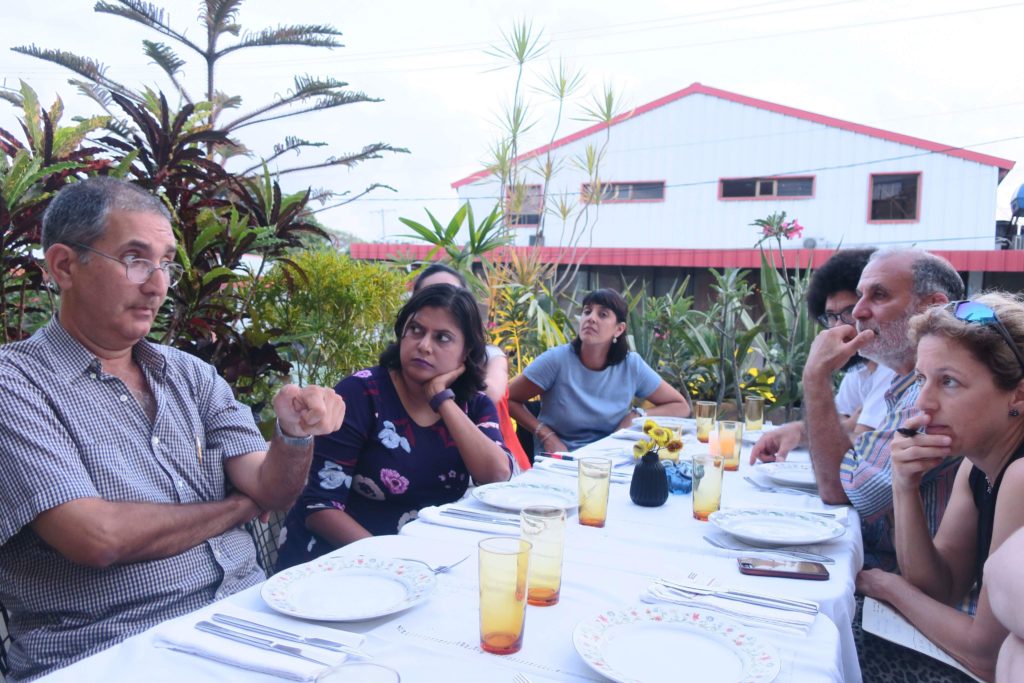
I have dreamed of visiting Cuba ever since I first heard of its success in universal health coverage, as a student of public health. Since Cuba is located in the Caribbean, about halfway around the world from Malaysia, visiting this country seemed like a distant dream. Through the auspices of Atlantic Philanthropies and Cuba Platform, I was fortunate to join representatives from Atlantic Fellows Programs based in South East Asia, South Africa, Europe, the United States and Australia to visit Havana, Cuba. The purpose of the Cuba Convening was for the representatives of Atlantic Fellows Programs to join with their Cuban counterparts in discussing global issues of equity, economics, food security and access to healthcare, education.
Cuba is a communist country. Since its revolution in 1959, Cuba has provided secure, rent-free housing, stable jobs, free healthcare and education for all. However, decades of United States lead trade embargo and the 1980s fall of the Soviet Union has been challenging for the economy and for ordinary Cubans to be part of the globalised world, and enjoy what people elsewhere take for granted.

My most striking impression of Cuban society was the stark economic inequities derived by the dual currency system. Cuba has two official currencies: The Cuban Convertible Peso (CUC) and the Cuban peso (CUP). The CUC is pegged to the United States dollar (USD) and is used by foreigners. The CUP is the currency used by locals. Locals are paid in CUP and conduct all transactions with the CUP. The CUP is approximately 1 in 25 the value of the CUC. The average monthly salary in Cuba is 740 CUC. Cubans linked with the tourism and hospitality industries have access to foreign currency and are much better off than others. The government salaries in Cuba are too low to maintain a decent standard of living, even though housing, healthcare, education and a basic food stipend is provided. Most people take additional jobs to supplement their income and many Cubans are dependent on remittances from family members living abroad.

Also salient is the disparities between races. Although Cuba is a communist country, in which all people have equality in the eyes of the state, it is striking that racial inequities still exist. The Afrocuban community is descendent of slaves brought in by the Spanish to work in the sugar plantations. The post-revolution land and housing reforms provided this community with secure housing, but they are still living in pre-revolution housing estates that were formerly segregated. The neighbourhood in which you live in Havana is important as services like schools and hospitals are geographically linked. The Afrocuban community has less access to remittances from abroad, and thus are also less advantaged.
Cuba like most countries in Latin America has a patriarchal society. Although, the government and communist philosophy promotes gender equality, these issues are still present in society. Violence against women may be acerbated due to housing issues, where multiple generations of family live together in cramped quarters. Also, there is a lack of safe houses or alternative housing to cater to women escaping violence at home.
Due to the trade embargo, imported goods are limited. Food is grown locally without fertilisers, pesticides or heavy equipment, which are taken for granted by farmers elsewhere. The best quality food and imported food items are sold at ‘palidars’ for consumption of tourists. Business and enterprise is challenging in this environment where there are many restrictions to the market economy (although the market does exist)
All these make Cuba a unique case study on political structure, solidarity and individuality, and resilience within adversity. We were fortunate to be hosted by the Cuban Platform, with their vast experience and contacts in Cuba, were able to carefully construct an experience that allowed us to interact with ordinary Cubans, and community leaders, NGOs, business people, and academics. It was also rewarding to travel and experience this country with an international group. Although we were all cognizant of respecting the context of the country, there were many rewarding discussions that were flavoured perspectives of people from different backgrounds. I also learned that being present in the context of others and listening without judgement, is sometimes more valuable than expressing an opinion.
‘Use the minimal space of your power…’
Paulo Freire
Written by: Tharani Loganathan the 2017 Equity Initiative Fellow and Atlantic Senior Fellow.





You must be logged in to post a comment.